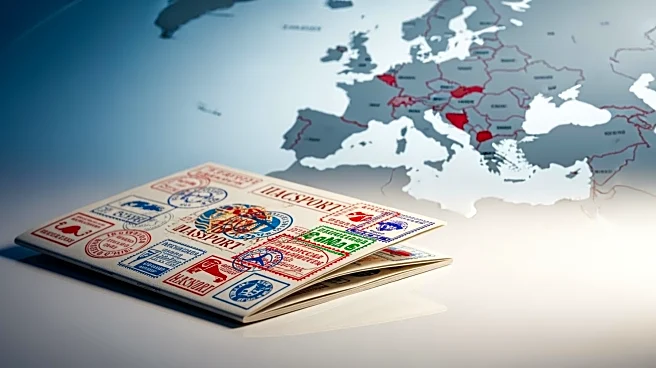What's Happening?
Russian outbound travel has experienced a notable increase, with 10.35 million journeys recorded in the third quarter of 2025, marking a 5.4% rise compared to the same period in 2024. This resurgence is part
of a broader trend, with 24 million trips made in the first nine months of the year, reflecting a 6.75% year-on-year growth. The data, provided by the Russian Federal Security Service's Border Service, indicates a recovery from the declines caused by the COVID-19 pandemic and related sanctions. The Association of Tour Operators of Russia (ATOR) notes that this increase is driven by both leisure and a search for normalcy. A significant portion of these trips, about 37.2%, were to neighboring countries, including former Soviet states like Abkhazia, Kazakhstan, and Georgia. However, the figures for Abkhazia are inflated due to daily crossings by dual citizens.
Why It's Important?
The rebound in Russian outbound travel has significant implications for the tourism industries of neighboring countries. Destinations like Georgia and Uzbekistan have seen substantial increases in Russian tourists, which can boost local economies. However, the data also highlights the complexity of distinguishing between genuine tourism and other forms of cross-border movement, such as labor migration. This resurgence in travel reflects a pent-up demand for international experiences among Russians, which could lead to increased economic activity in the tourism sectors of these countries. However, the situation remains fragile, with potential disruptions from economic instability and geopolitical tensions.
What's Next?
As the year progresses, the focus will shift to the fourth quarter to see if the upward trend in Russian outbound travel continues during the holiday season. Airlines and travel companies may need to adjust their capacities to meet the demand. Additionally, neighboring countries might consider enhancing their tourism infrastructure and services to accommodate the influx of Russian tourists. However, ongoing economic and geopolitical uncertainties could pose challenges to sustaining this growth.
Beyond the Headlines
The increase in Russian outbound travel also raises questions about the sustainability of tourism growth in neighboring countries. There is a need to balance economic benefits with potential environmental and social impacts. Moreover, the reliance on Russian tourists could make these countries vulnerable to shifts in Russian travel patterns due to economic or political changes. This situation underscores the importance of diversifying tourism markets to ensure long-term stability.








